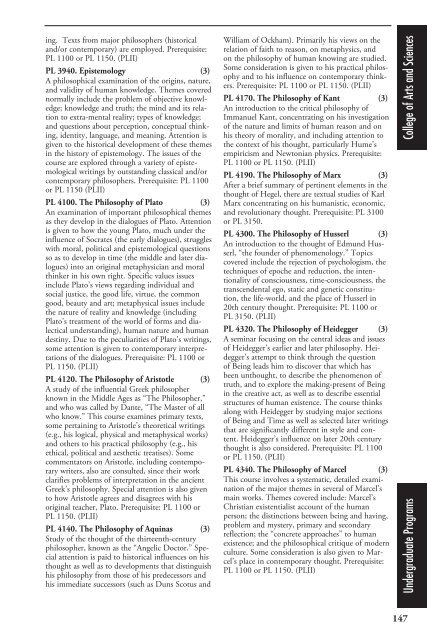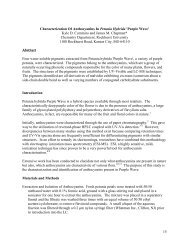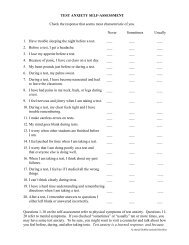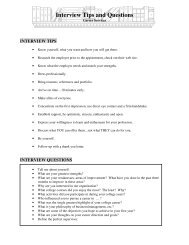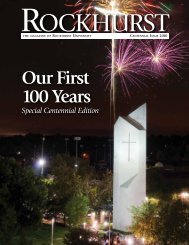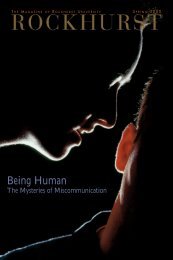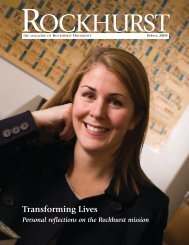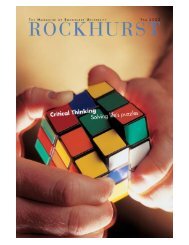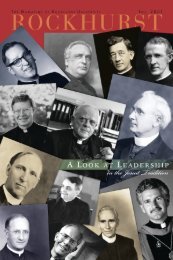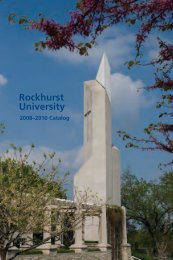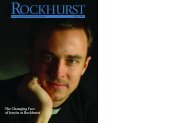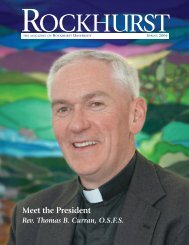RockhuRst univeRsity 2012â2014 catalog
RockhuRst univeRsity 2012â2014 catalog
RockhuRst univeRsity 2012â2014 catalog
- No tags were found...
Create successful ePaper yourself
Turn your PDF publications into a flip-book with our unique Google optimized e-Paper software.
ing. Texts from major philosophers (historicaland/or contemporary) are employed. Prerequisite:PL 1100 or PL 1150. (PLII)PL 3940. Epistemology (3)A philosophical examination of the origins, nature,and validity of human knowledge. Themes coverednormally include the problem of objective knowledge;knowledge and truth; the mind and its relationto extra-mental reality; types of knowledge;and questions about perception, conceptual thinking,identity, language, and meaning. Attention isgiven to the historical development of these themesin the history of epistemology. The issues of thecourse are explored through a variety of epistemologicalwritings by outstanding classical and/orcontemporary philosophers. Prerequisite: PL 1100or PL 1150 (PLII)PL 4100. The Philosophy of Plato (3)An examination of important philosophical themesas they develop in the dialogues of Plato. Attentionis given to how the young Plato, much under theinfluence of Socrates (the early dialogues), struggleswith moral, political and epistemological questionsso as to develop in time (the middle and later dialogues)into an original metaphysician and moralthinker in his own right. Specific values issuesinclude Plato’s views regarding individual andsocial justice, the good life, virtue, the commongood, beauty and art; metaphysical issues includethe nature of reality and knowledge (includingPlato’s treatment of the world of forms and dialecticalunderstanding), human nature and humandestiny. Due to the peculiarities of Plato’s writings,some attention is given to contemporary interpretationsof the dialogues. Prerequisite: PL 1100 orPL 1150. (PLII)PL 4120. The Philosophy of Aristotle (3)A study of the influential Greek philosopherknown in the Middle Ages as “The Philosopher,”and who was called by Dante, “The Master of allwho know.” This course examines primary texts,some pertaining to Aristotle’s theoretical writings(e.g., his logical, physical and metaphysical works)and others to his practical philosophy (e.g., hisethical, political and aesthetic treatises). Somecommentators on Aristotle, including contemporarywriters, also are consulted, since their workclarifies problems of interpretation in the ancientGreek’s philosophy. Special attention is also givento how Aristotle agrees and disagrees with hisoriginal teacher, Plato. Prerequisite: PL 1100 orPL 1150. (PLII)PL 4140. The Philosophy of Aquinas (3)Study of the thought of the thirteenth-centuryphilosopher, known as the “Angelic Doctor.” Specialattention is paid to historical influences on histhought as well as to developments that distinguishhis philosophy from those of his predecessors andhis immediate successors (such as Duns Scotus andWilliam of Ockham). Primarily his views on therelation of faith to reason, on metaphysics, andon the philosophy of human knowing are studied.Some consideration is given to his practical philosophyand to his influence on contemporary thinkers.Prerequisite: PL 1100 or PL 1150. (PLII)PL 4170. The Philosophy of Kant (3)An introduction to the critical philosophy ofImmanuel Kant, concentrating on his investigationof the nature and limits of human reason and onhis theory of morality, and including attention tothe context of his thought, particularly Hume’sempiricism and Newtonian physics. Prerequisite:PL 1100 or PL 1150. (PLII)PL 4190. The Philosophy of Marx (3)After a brief summary of pertinent elements in thethought of Hegel, there are textual studies of KarlMarx concentrating on his humanistic, economic,and revolutionary thought. Prerequisite: PL 3100or PL 3150.PL 4300. The Philosophy of Husserl (3)An introduction to the thought of Edmund Husserl,“the founder of phenomenology.” Topicscovered include the rejection of psychologism, thetechniques of epoche and reduction, the intentionalityof consciousness, time-consciousness, thetranscendental ego, static and genetic constitution,the life-world, and the place of Husserl in20th century thought. Prerequisite: PL 1100 orPL 3150. (PLII)PL 4320. The Philosophy of Heidegger (3)A seminar focusing on the central ideas and issuesof Heidegger’s earlier and later philosophy. Heidegger’sattempt to think through the questionof Being leads him to discover that which hasbeen unthought, to describe the phenomenon oftruth, and to explore the making-present of Beingin the creative act, as well as to describe essentialstructures of human existence. The course thinksalong with Heidegger by studying major sectionsof Being and Time as well as selected later writingsthat are significantly different in style and content.Heidegger’s influence on later 20th centurythought is also considered. Prerequisite: PL 1100or PL 1150. (PLII)PL 4340. The Philosophy of Marcel (3)This course involves a systematic, detailed examinationof the major themes in several of Marcel’smain works. Themes covered include: Marcel’sChristian existentialist account of the humanperson; the distinctions between being and having,problem and mystery, primary and secondaryreflection; the “concrete approaches” to humanexistence; and the philosophical critique of modernculture. Some consideration is also given to Marcel’splace in contemporary thought. Prerequisite:PL 1100 or PL 1150. (PLII)Undergraduate College of Arts Programs & SciencesCollege of Arts and Sciences147


